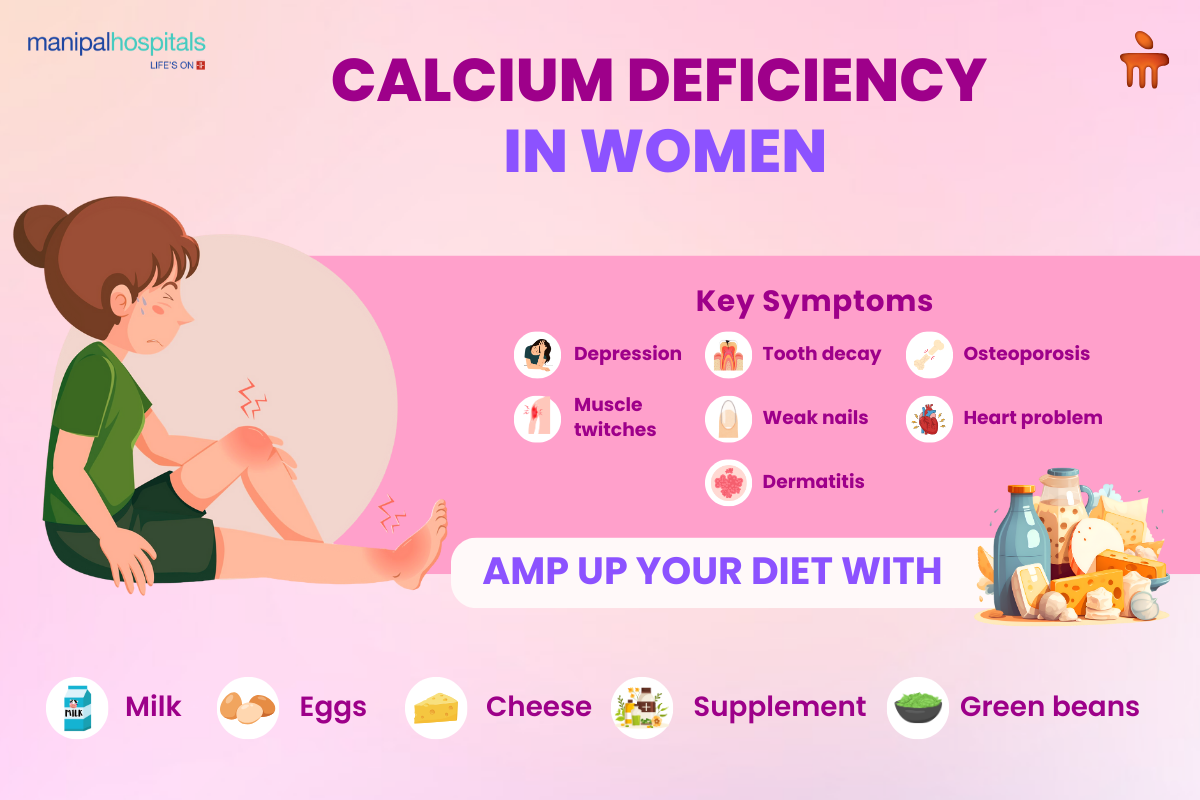
Calcium is an essential component for maintaining strong bones, muscle function, and nerve signalling. For women, calcium intake is particularly important as they age, because they lose bone mass due to hormonal changes, particularly after menopause. However, calcium deficiency is common, leading to various health issues if left untreated. Let’s explore everything there is to know about calcium deficiency in women: its symptoms, causes, treatments, and preventive measures.
Synopsis
Symptoms of Calcium Deficiency in Women

Calcium deficiency, also known as hypocalcemia, can manifest in several ways, some more noticeable than others. Let us check out some of the common calcium deficiency symptoms in females.
1. Bone Weakness and Frequent Fractures
One of the primary signs of calcium deficiency is weakening bones, which may result in frequent bone pain and discomfort. If left untreated, this can escalate into osteoporosis in older women. This is a condition where bones become brittle and more prone to fractures.
2. Muscle Cramps and Spasms
Calcium plays a critical role in muscle contraction. A deficiency may cause involuntary muscle spasms, particularly in the legs and back, leading to cramps and discomfort.
3. Numbness and Tingling
If calcium levels drop, women may experience sensations like numbness and tingling, particularly in the extremities, such as fingers and toes. This is a sign that nerves are being affected.
4. Fatigue
Chronic fatigue or feeling of tiredness without exertion can be a sign of low calcium levels. The body struggles to maintain normal muscle function, causing tiredness even after light physical activity.
5. Dental Issues
A lesser-known symptom of calcium deficiency is weak teeth, increased risk of cavities, and gum disease, as calcium is necessary for healthy teeth and gums.
6. Irregular Heartbeat
Severe cases of calcium deficiency in menopausal women may even affect the heart, causing palpitations or irregular heart rhythms, as calcium aids in proper heart function.
For expert advice, do not hesitate to consult our top gynaecologist in Whitefield if you are experiencing Calcium Deficiency in Women Symptoms.
Causes of Calcium Deficiency in Women
There are multiple causes of calcium deficiency in women, and understanding them can help prevent future health complications.
-
Poor Dietary Intake: A diet low in calcium-rich foods can lead to insufficient calcium levels over time.
-
Age: As women age, their ability to absorb calcium decreases, particularly after menopause due to declining estrogen levels.
-
Vitamin D Deficiency: Without enough vitamin D, the body cannot absorb calcium efficiently, leading to a deficiency.
-
Medical Conditions: Conditions like celiac disease, inflammatory bowel disease (IBD), or chronic kidney disease can affect calcium absorption.
-
Sedentary Lifestyle: Physical inactivity can affect bone health. Without regular weight-bearing exercises, bones can weaken, leading to calcium loss over time.
-
Hormonal Changes: Pregnant and breastfeeding women need more calcium to support the growing baby’s needs.
Treatment of Calcium Deficiency
Treatment of calcium deficiency is crucial to prevent long-term damage to bones and muscles. Let us find out some of the most effective methods to manage calcium deficiency.
1. Calcium-Rich Diet
The most straightforward treatment is increasing the intake of calcium-rich foods. Dairy products like milk, cheese, and yoghurt are excellent sources of calcium. For those who are lactose intolerant or vegan, leafy greens like kale, spinach, and fortified plant-based milk can provide adequate calcium levels.
2. Calcium Supplements
If dietary changes alone aren’t sufficient, calcium supplements may be recommended. Always consult with a healthcare provider to determine the right dosage, as too much calcium can lead to other health issues.
3. Vitamin D Supplements
Since vitamin D is necessary for calcium absorption, ensuring adequate vitamin D levels is essential. This can be done through sun exposure, diet (fish, fortified foods), or supplements.
4. Exercise
Engaging in at least 30 minutes of weight-bearing exercises, like walking, jogging, or resistance training, can strengthen bones and improve calcium absorption. A regular exercise routine is crucial for bone health.
5. Hormone Replacement Therapy (HRT)
For postmenopausal women, hormone replacement therapy may be recommended to maintain estrogen levels and prevent calcium deficiency, particularly if they are at risk of osteoporosis.
Consult our gynaecology hospital in Whitefield for managing and treating Low Calcium Symptoms in Women.
Prevention of Calcium Deficiency
Preventing calcium deficiency is easier than treating it. Other than following a healthy calcium-rich diet and exercise, limit your caffeine and alcohol intake. This is because excessive consumption of caffeine and alcohol can reduce calcium absorption. Regular check-ups, including bone density tests, hold equal importance as they can help detect any early signs of calcium deficiency, allowing for timely intervention.
You can talk to our experienced gynaecologist in Whitefield to seek guidance on specific preventive measures.
Conclusion
Calcium deficiency in women is a common but manageable condition. By understanding the calcium deficiency symptoms in females, its causes, and treatments, women can take proactive steps to maintain their bone and overall health. Incorporating a balanced diet, regular exercise, and medical guidance can go a long way in preventing and managing this problem.
FAQ's
For most women, the recommended daily intake is 1,000 mg of calcium per day. Postmenopausal women or women over the age of 50 should aim for 1,200 mg daily.
Yes, long-term calcium deficiency can result in decreased bone mass and lead to osteoporosis in elderly women. This condition can make bones fragile and more prone to fractures due to trivial injuries.
Dairy products such as milk, cheese, and yoghurt are the best sources of calcium-rich foods for vegetarians. For those who are vegan and avoid dairy, fortified plant-based milk, leafy greens, tofu, and almonds are good alternatives.





















 5 Min Read
5 Min Read














